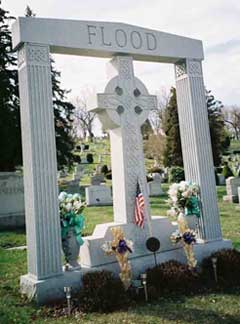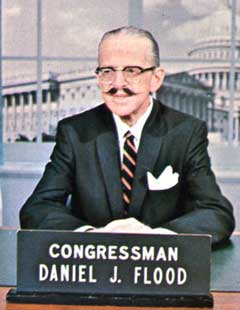"One Flood Against Another:" A Review of Dapper Dan Flood Dapper Dan Flood: The Controversial Life of a Congressional Power Broker by William C. Kashatus June 14, 2010 The temptation to discuss both the late Flood and the soon-to-be-late Schaefer here is strong. Both were very much alike, skillfull lumber harvesters in the federal money forests of the mid Twentieth-Century. Yet their belief in federal handouts was matched by their belief in traditional values, in loyalty to God and country. Both were showmen extraordinaire, abusive, flakey, but also as honest as politicians can be and genuinely concerned public servants. Both got into trouble, but neither ever got rich. However, I must confine this to Dan Flood and save Don Schaefer for another time. Imagine yourself to be a truck driver barreling aggressively down the newly-completed Insterstate 81 through Luzerne County, PA in the early 1970s. Alongside pulls a white Cadillac convertible carrying three people, a dachshund, a parakeet and a goldfish. One of the passengers is a man who looks like Snidely Whiplash--no exaggeration, except this guy's suit is as white as the covertible. He leans over the passenger door and starts screaming up at you: "You bastard! I built this highway, dammit, and you're going too goddamned fast!" In this true incident we find not only the "nut graph" about Daniel J. Flood, we find many of the things that would exclude him from being elected today. Look at what happened to Howard Dean for screaming. "Losing it" was part of Dan Flood's technique that he, as senior member of some of the House's most powerful committees, daily practiced on military brass and bureaucrats. The newly published book, Dapper Dan Flood, written by the son of a Flood political ally, corroborates memories that my father shared about working for his hometown representative in the 1950s, memories of Flood cursing at generals and admirals on the phone. Nowadays, the chastised truck driver would be a "Joe The Plumber" and probably end up running for office himself. The religious right would be on Flood's tail for taking the Lord's name in vain. His only bit of luck would be that nobody anymore knows what a bastard is. Flood was never afraid to remind people of the enormous power that he had accumulated as a representative who had no higher ambition than serving his constituents in Congress. He didn't really build I-81 (Exaggeration was one of his foibles), but he did get its course diverted to carry traffic past languishing Wilkes-Barre and its surrounding, knitted-together towns. Today when one follows I-81's descent into the Wyoming Valley, the most prominent thing that one notices, sitting atop one of the higher hills like a temple (except that it has a water tower), is the Veterans Administration Hospital. This is one of Flood's many gifts to his district and the amazing thing is, he secured it during his very first term in the mid 1940s. The power, born when Speaker of The House, Sam Rayburn took a liking to the freshman Rep from PA's 11th District and fattened by friendship with John F. Kennedy, came in handy when, in June of 1972, Tropical Storm Agnes freakishly made a hard left turn off the Jersey Coast and circled over Pennsylvania for three days. Only a greatly feared defense appropriator of many years could bring the U.S. military to to bear on the catastrophic but local rage of waters. Flood was even able to get a Navy fireboat flown in to put out a fire in Wilkes-Barre. Did he exceed his authority? Hell, yes! But he saved at least a thousand lives. Then there was the aftermath: a mud-caked, dust-choked Susquehanna River valley where bodies had been exhumed en masse from riverside cemeteries, and the rubble and debris of bridges, roads and homes was overwhelming. Anticipating the age of the sound-bite (in which he would have a hard time), the congressman proclaimed: 'This is going to be one Flood against another." Luxury cars are not what they used to be, but does any contemporary member of Congress ride around in a distinctive one? Henry Waxman brushed me out of the way with the door of a SUV that he was dismounting. In Flood's time, the public expected leaders to ride in Cadillacs and Flood liked the convertibles. Another memory of my father was that of Flood's wife, Catherine driving the couple through Bethesda on the way home to Wilkes-Barre in the days of tailfins. Flood's constituents also thought that his white and green paisley suits were classy. Today, when the national uniform is jeans and a t-shirt, anyone who dresses like a grown-up, wears pinstripes or even merely a tie, is thought of--and taken about as seriously as--the high-school class geek. In spite of some production flaws (research lapses, grammar and an incomplete index), William C. Kashatus's book is a good first telling of the Flood legend. However, as interesting as Flood and his Congressional career were, I doubt that they have any lessons that could be of value in this age of anti-incumbency and governments going broke. |
|
| A 1960s postcard of Rep. Daniel J. Flood, with the waxed mustache he developed in his days as a Vaudeville/Broadway actor. A bout with cancer left him emaciated and enhanced the Snidely Whiplash appearance. Unknown to the public, Flood became dependent on alchohol and drugs to ease the pain. His addictions, along with possible senility, led him to put a dishonest staffer in charge of his office. The staffer's taking of bribes eventually brought about Flood's downfall in 1980. He died in 1994 at age 91. |
 |
Dan Flood's grave in St. Mary's Cemetery, Lee Park, PA, is just a few rows from the graves of my great grandparents. My father, as a student at Georgetown University, worked in Flood's office. William C. Kashatus' book, Dapper Dan Flood, covers many characters who were friends, acquaintances and benefactors of my parents. Note the American Flag/medallion for veterans placed by The American Legion. Flood was another politician who exaggerated his military service. |
| Thumbnails for Your Facebook Links | |
